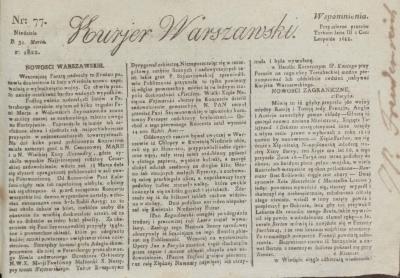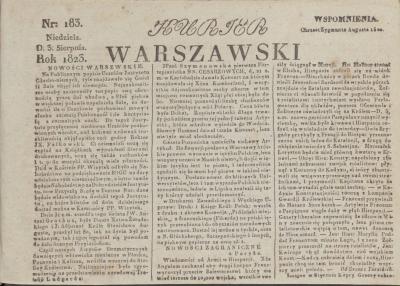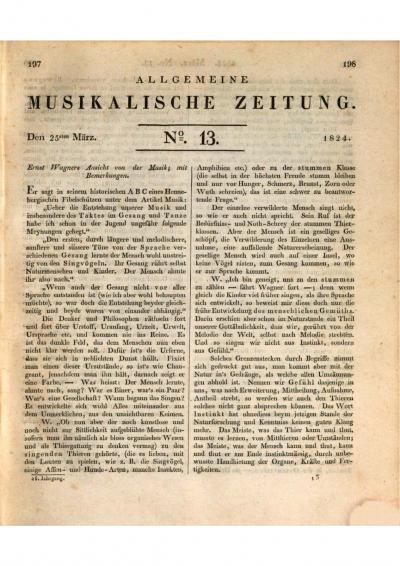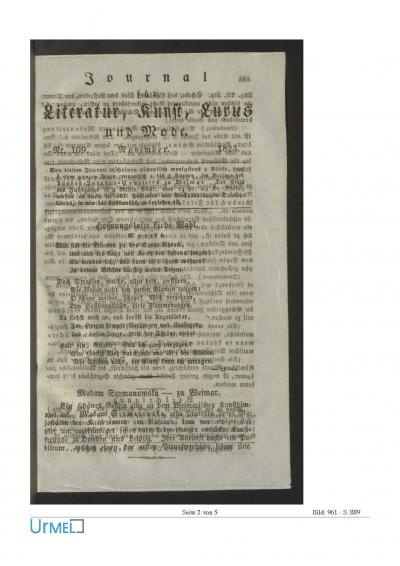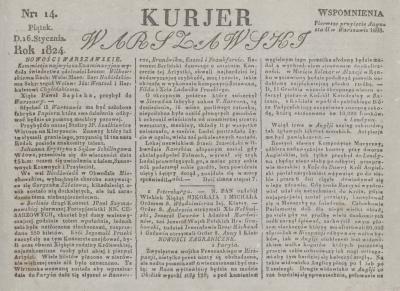Madame Szymanowska and Goethe – a burning love?

Goethe (Fig. 6-8), who, between 1785 and 1820, had been to take the waters in Carlsbad twelve times and in the Giant Mountains and in Teplitz once each,[21] then spent three summers in Marienbad. During his first stay since 29 July 1821, he took accommodation in “Brösigke’sches Haus”, a prestigious hotel with one hundred rooms over three floors (Fig. 9), which was run by Amalie von Levetzow and her parents, Mr and Mrs Brösigke. Goethe met the “sophisticated and pleasant” Mrs von Levetzow for the first time in Carlsbad in 1806 and was inspired by her to create his dramatic festival “Pandora” (1808). After the divorce from her first husband and the loss of her second husband at the battle of Waterloo, she used the rest of her fortune to build the hotel in Marienbad with her parents for select resort guests to stay; her family then also lived in the hotel. When they ran out of money, the high-ranking Austrian government official Franz von Klebelsberg zu Thumburg jumped in and was registered as an owner. He would soon became Amalie’s lover and later her husband, and the house was also named “Palais Klebelsberg” after him.[22]
Goethe was welcomed into the Brösigke family from the very start. The seventy-two-year-old, whose wife Christiane, née Vulpius, died in 1816 and who became seriously ill in spring 1821, quickly developed a deep affection for Ulrike (Fig. 10), the eldest of the three daughters of Amalie von Levetzow. The seventeen-year-old, who had only just come back from finishing school in Strasbourg, initially saw in the poet and Weimar minister, who until then had been unknown to her, just a lovable old man whose continuous attention flattered her. Summer 1822, the whole of which Goethe spent with the Brösigke family, fired up his love for Ulrike von Levetzow. He accompanied her on walks and outings, danced with her at balls and gave her presents. She, it is said, “felt a girlish affection for Goethe, a love such as an eighteen-year-old shows to someone who spoils her in a fatherly-manly way.”[23]
In August 1823 – this time Goethe was living in the Zur Goldenen Traube, whilst his sovereign, Grand Duke Carl August von Sachsen-Weimar-Eisenach, with is entourage alighted in the “Graf klebelsbergisches Hause”[24] – Goethe’s love for Ulrike blossomed to an obsession from which only a marriage proposal could release him. The Grand Duke himself asked Frau von Levetzow for her daughter’s hand for Goethe, whilst the high society between Bavaria, Thüringen and Prussia, Marienbad, Carlsbad and Vienna, and especially Goethe’s son August and his wife Ottilie in Weimar, were extremely alarmed due to the impending disparate match. However, Ulrike, who later and right into her old age insisted that: “It was not a love affair”, had her mother communicate that she could not imagine such a match because Goethe lived together with his son and daughter-in-law in Weimar and could not bear to be separated from her own family.[25]
Whilst Goethe still hoped and did not want to admit to himself that his desire to marry would not come to fruition, he met ladies, who were also attractive to him and who could help him through his incipient heartache. The twenty-three-year-old Lili Parthey arrived in Marienbad from Berlin. She was the granddaughter of the Berlin author and publisher Friedrich Nicolai, student of Zelter and was acquainted with the Mendelssohn family and with Prince Radziwill, who was still working on the score for “Faust” and would continue to do so right up into the 1830s. She conveyed greetings and a kiss from Zelter and fell spontaneously in love with Goethe, whilst he reported to Princess Pauline von Hohenzollern, who had arranged the meeting, that the quite amorous encounter could have ended “very badly and dangerously”.[26] Goethe also spoke to Maria Szymanowska, in his poem dedicated to her, about “the twofold bliss of music and of love”, whereby she perhaps already guessed that his love was promised to another.[27]
[21] Compare Urzidil 1981 (see Literature), pages 13-134
[22] Gersdorff 2005 (see Literature), pages 11-13, 20 f.
[23] Ibid, page 36
[24] List 1823 (compare Note 9, see PDF 1), No. 362-365, 2 July 1823
[25] Gersdorff 2005 (see Literature), pages 64-68
[26] Ibid, pages 51-53
[27] “And if, as there can be no doubt, she [Szymanowska] knew what was going on with Goethe at the time, then she also understood who had actually caused this tearful bliss that had exalted the power of music. ‘Who can pacify / An anguish'd heart whose loss hath been so great?‘“ (Urzidil 1981, see Literature, page 170)












